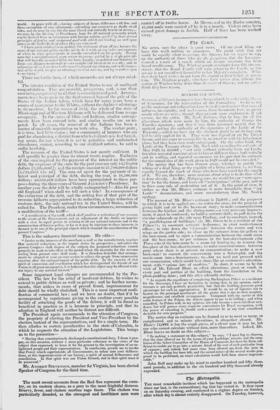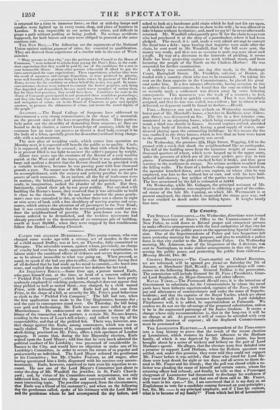Tjt airtropaIi.
THE most remarkable incident which has happened to the metropolis since our last, is the extraordinary fog that has visited it. It first came on on Saturday evening, and continued in a slighter degree on Sunday, after which day. it almost entirely disappeared. On Tuesday, however, it returned for a time in immense force; so that at mid-day lamps and candles were lighted up in every room, shop, and place of business in London. It was impossible to see across the street, and difficult to grope a path without Jostling or being jostled. No serious accidents happened, for both horses and men were obliged to proceed at the same cautious rate.
THE NEW BILL.—The following are the arguments of the National Union against making payment of rates, &c. essential to qualification. They are derived from experience of a similar rule in the case of West- minster.
" Many persons in that city," says the petition of the Council to the House of Commons, "were induced to refrain from paying the Poor's Rate, in the confi- dent expectation that they would be paid by one of the candidates for a scat in your honourable House. Many other persons who could ill atIhrd to pay the rates entertained the same expectations. These expectations, whether they were the result of meanness and corrupt disposition, or were produced by poverty, were well founded • the practice being to bribe voters, by payment of the Poors' Rates, to vote for tlie candidate on Whose behalf the money was paid. In nume- rous instances electors were induced to connnit the foulest perjuries, and, being thus degraded and demoralized, became much worse members of society than, but for these find practices, they would have been. Candidates for seats in the House of Commons participated in and promoted these scandalous proceedings; and they who had thus been suborners of perjury, demoralizers of the people, and instigators it crime, sat in the house ci Commons as pure and upright senators, to promote the abhorrence of crime, and insure the moral dignity of the people."
ANATOMY.—The Royal College of Surgeons have addressed to Government a very strong remonstrance, in the shape of a memorial, on the present state of the laws respecting dissection. They particu- larly point out the absurdity of demanding from surgeons, as they are bound to do by charter, a correct knowledge of anatomy, while by the common law no man can possess or dissect a dead body (except it be the body of a felon, specially given for dissection) without being charge- able with a misdemeanour.
The new plan of weighing coals, which comes into operation on Monday next, it is expected will benefit the public as to quality. Coals, it is supposed, will now be screened; as the dust with which the bushe[ is at present filled is too light to answer the seller's purpose by weight. About two years ago the creatures of the Rector of a very wealthy parish at the West end of the town, agreed that it was unbecoming so large and opulent a district that the Rector should not be provided with a suitable residence, because he was passing poor with four thousand pounds a year. No sooner was the idea started, than it was pursued to its accomplishment, with the secrecy and activity peculiar to the pro- posers of such measures. In an instant, all the fry of tradesmen were in motion ; the bricklayers and plasterers, and paper-bangers, had al- ready, in imagination, sacked the plunder of the parish. But they, fortunately, ruined their job by too great avidity. Not satisfied with building the Rector's house, they resolved that it was advisable to build it close to the church. We do not know whether the pious gentle- man's ease was consulted in this, or whether there was a charm in eight or nine acres of land, with a fine shrubbery of waving acacias and syca- mores, which attracts the attention of all passengers in tire New Road ; but it was certainly thought that the reverend gentleman could not en- dure the neighbourhood of poverty. The poor-house was for this reason ordered to be demolished, and the reckless miscreants had already proceeded to the destruction of an enormous pile of building, worth at least 30,0001., when they were stopped by that troublesome fellow Joe Hume 1—Morning Chronicle.



















































 Previous page
Previous page